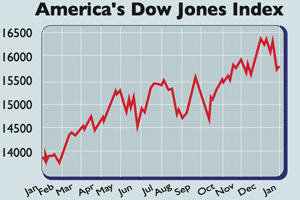Get the latest financial news, insights and expert analysis from our award-winning MoneyWeek team, to help you understand what really matters when it comes to your finances.
You are now subscribed
Your newsletter sign-up was successful
Want to add more newsletters?

Twice daily
MoneyWeek
Get the latest financial news, insights and expert analysis from our award-winning MoneyWeek team, to help you understand what really matters when it comes to your finances.

Four times a week
Look After My Bills
Sign up to our free money-saving newsletter, filled with the latest news and expert advice to help you find the best tips and deals for managing your bills. Start saving today!
The US stock market hasn't seen a correction' of 10% or more since the summer of 2011. Now, having gained 50% since then, it seems to be taking a breather.
Last week, the Dow Jones index slid by 3.5%, its worst week since November 2011. The pan-European FTSE Eurofirst 300 index lost 3.25%, falling by 2.4% on Friday alone, the steepest one-day fall in seven months. Japan's Nikkei has hit a three-month low.
The turbulence stems from emerging markets, which have run into trouble because money is flowing out of risky assets as US monetary policy tightens.
MoneyWeek
Subscribe to MoneyWeek today and get your first six magazine issues absolutely FREE

Sign up to Money Morning
Don't miss the latest investment and personal finances news, market analysis, plus money-saving tips with our free twice-daily newsletter
Don't miss the latest investment and personal finances news, market analysis, plus money-saving tips with our free twice-daily newsletter
Some emerging markets look especially vulnerable to money being pulled out, while there are several other problems afflicting various regions. There is even talk of another crisis.
That casts doubt on the outlook for global growth and developed-market profits, especially as the profits of large companies in many of the world's most important stock markets are now increasingly dependent on the world economy.
Firms in the FTSE 100 and Germany's Dax, for instance, make around 70% of their sales abroad. German exports to Brazil, Russia, India and China grew fivefold between 2000 and 2011. The slowdown in emerging markets helps to explain why profit warnings from FTSE 350 firms hit their highest level since 2008 last quarter.

On Wall Street, which sets the tone for world equities, the cyclically adjusted price-to-earnings ratio is over 25, a level that implies poor long-term returns.
Profits rose by just 8% last year, while the S&P gained 29%. Profit forecasts have fallen recently. "Earnings continue to disappoint," says Money.cnn.com. Profit growth has been reasonable "as opposed to spectacular". The trouble is that investors had priced in the latter.
For now at least, the wobble looks more like a repeat of the turbulence seen in summer 2012 than the start of something nastier. If it does escalate, the Federal Reserve, America's central bank, could always prop up markets by putting tapering on hold, giving easy-money-addicted markets another hit.
But having got a long way ahead of themselves last year, markets could face a bumpy 2014.
Get the latest financial news, insights and expert analysis from our award-winning MoneyWeek team, to help you understand what really matters when it comes to your finances.
MoneyWeek is written by a team of experienced and award-winning journalists, plus expert columnists. As well as daily digital news and features, MoneyWeek also publishes a weekly magazine, covering investing and personal finance. From share tips, pensions, gold to practical investment tips - we provide a round-up to help you make money and keep it.
-
 Should you buy an active ETF?
Should you buy an active ETF?ETFs are often mischaracterised as passive products, but they can be a convenient way to add active management to your portfolio
-
 Power up your pension before 5 April – easy ways to save before the tax year end
Power up your pension before 5 April – easy ways to save before the tax year endWith the end of the tax year looming, pension savers currently have a window to review and maximise what’s going into their retirement funds – we look at how

